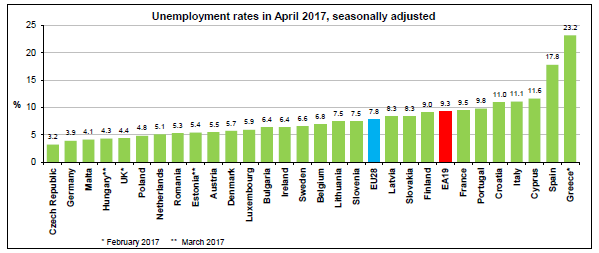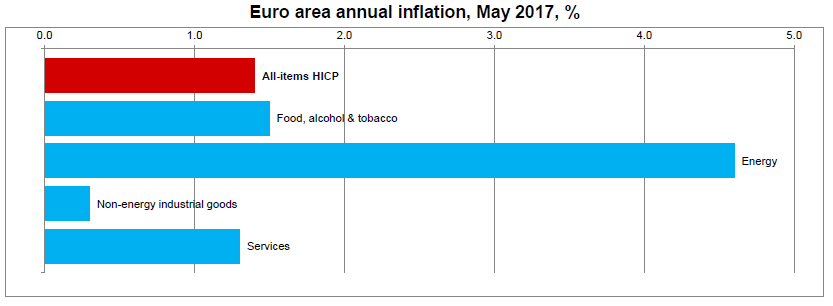Eurostat/Euro area unemployment at 9.3%/31 Μαΐου 2017 The euro area (EA19) seasonally-adjusted unemployment rate was 9.3% in April 2017, down from 9.4% in March 2017 and down from 10.2% in April 2016. This is the lowest rate recorded in the euro area since March 2009. The EU28 unemployment rate was 7.8% in April 2017, down from 7.9% in March 2017 and from 8.7% in April 2016. This is the lowest …Read More
Τη δοσολογία της ποσοτικής εξετάζει η ΕΚΤ στις 8 Ιουνίου
Η Καθημερινή, (2017), “Τη δοσολογία της ποσοτικής εξετάζει η ΕΚΤ στις 8 Ιουνίου”, 31 Μαΐου Οι κεντρικοί τραπεζίτες της Ευρωζώνης ετοιμάζονται να αλλάξουν την εκτίμησή τους για την πορεία της οικονομίας της Ευρωζώνης και τις απειλές που αντιμετωπίζει, σύμφωνα με αποκλειστικές πληροφορίες του Reuters. Στη συνεδρίαση της 8ης Ιουνίου είναι πιθανόν η ΕΚΤ να εξαλείψει από την ανακοίνωσή της την υπόσχεση να αυξήσει τα μέτρα ενίσχυσης της οικονομίας, αν χρειαστεί. …Read More
Euro area annual inflation down to 1.4%
Eurostat/Euro area annual inflation down to 1.4% /31 Μαΐου 2017 Euro area annual inflation is expected to be 1.4% in May 2017, down from 1.9% in April 2017, according to a flash estimate from Eurostat, the statistical office of the European Union. Looking at the main components of euro area inflation, energy is expected to have the highest annual rate in May (4.6%, compared with 7.6% in April), followed by …Read More
Flexible labour markets, real wages, and economic recoveries: Views of economists
Den Haan, Wouter, Ellison, Martin, Ilzetzki, Ethan,McMahon, Michael, Reis, Ricardo, (2017), “Flexible labour markets, real wages, and economic recoveries: Views of economists”, VoxEU, 30 Μαΐου Real hourly wage growth has behaved quite differently across countries over the past ten years. This column describes how the majority view of the latest Centre for Macroeconomics and CEPR expert survey is that low growth of real wages has had a positive impact on …Read More
Solving Non-Performing Loans in Europe to speed up the recovery
Beynet, Pierre, (2017), “Solving Non-Performing Loans in Europe to speed up the recovery”, OECD ECOSCOPE, 23 Μαΐου Almost 10 years after the outset of the financial crisis in summer 2008, European growth remains modest, constantly underperforming the OECD average. Several factors explain this disappointing performance. The pace of fiscal consolidation was rapid in the countries most affected by the crisis while structural reforms were not sufficiently pursued in other countries. …Read More
Reforms for more and better quality jobs in Spain
Jin, Yosuke, Caldera Sánchez, Aida, Garcia Perea, Pilar, (2017), “Reforms for more and better quality jobs in Spain “, OECD Economics Department Working Papers, No 1386, 30 Μαΐου The Spanish economy is growing strongly, but there is a risk that many people are being left behind. Unemployment, especially among young people and the low-skilled, remains very high. About half of all the unemployed have been unemployed for over a year …Read More
Is the recent increase in long-term interest rates a threat to euro-area recovery?
Clayes, Gregory, Efstathiou, Konstantinos, (2017), “Is the recent increase in long-term interest rates a threat to euro-area recovery?”, Bruegel, 29 Μαΐου After reaching historically low levels in the first half of 2016, European long-term sovereign yields experienced a notable increase in the second half of 2016 and at the beginning of 2017, before stabilising in the last few months. The nominal long-term interest rate can be decomposed into the following components: …Read More
Business models of the banks in the euro area
Farne, Matteo, Vouldis, Angelos, (2017), “Business models of the banks in the euro area”, ECB, Μάιος 2017 The paper identifies the business models followed by banks in the euro area, utilising a proprietary dataset collected in the context of the supervisory reporting of the Single Supervisory Mechanism. The concept of a ‘business model’ has been neglected by economic theory and is defined here with respect to the set of activities performed …Read More
Bank bail-in: The effects on credit supply and real economy
Beck, Thorsten, Samuel Da-Rocha-Lopes, Samuel, Silva, Andre, (2017), “Bank bail-in: The effects on credit supply and real economy”, VoxEU, 26 Μαΐου The new resolution and bail-in regime in Europe hypothetically lets banks fail without resorting to public funding. This column examines the effects of the bail-in of the Portuguese Banco Espírito Santo. Existing borrowers from the banks exposed to the bail-in experienced a negative impact on their credit supply from …Read More
Bank resolution: The importance of a public backstop
Cecchetti, Stephen, Schoenholtz, Kim, (2017), “Bank resolution: The importance of a public backstop”, Vox Eu, 28 Μαΐου 2017 The failure of Lehman on 15 September 2008, signalled the most intense phase of the Global Crisis of 2007-2009, fuelling a run on a broad array of intermediaries. Following Congress’ approval of the Troubled Asset Relief Program (TARP) funding that was used mostly to recapitalise US financial firms, the mantra of US regulators became …Read More






